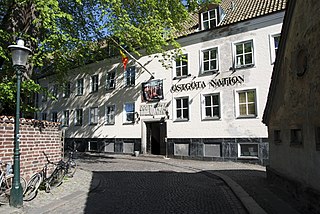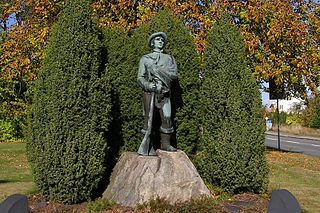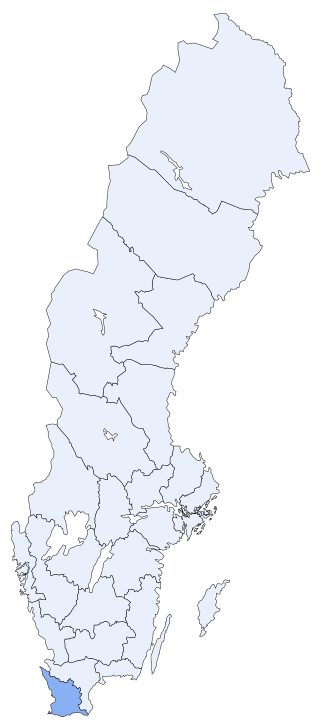Related Research Articles

Lund University is a public research university in Sweden and one of Northern Europe's oldest universities. The university is located in the city of Lund in the Swedish province of Scania. It traces its roots back to 1425, when a Franciscan studium generale was founded in Lund. After Sweden won Scania from Denmark in the 1658 Treaty of Roskilde, the university was officially founded in 1666 on the location of the old studium generale next to Lund Cathedral.

The Øresund Region, also known as the Greater Copenhagen Region, is a transnational metropolitan region encompassing the Capital Region and Region Zealand in eastern Denmark and Region Skåne and Region Halland in southern Sweden. Centred around the Øresund strait and the two cities which lie on either side, Copenhagen in Denmark and Malmö in Sweden, the region is connected by the Øresund Bridge, which spans the strait at its southern end, and the HH Ferry route between Helsingør, Denmark, and Helsingborg, Sweden, at the narrowest point of the strait.

Kristianstad is a city and the seat of Kristianstad Municipality, Scania County, Sweden with 40,145 inhabitants in 2016. During the last 15 years, it has gone from a garrison town to a developed commercial city, today attracting visitors in the summertime mainly from Germany, Denmark and The Netherlands.
The student nations or nationer at the two ancient universities in Uppsala and Lund, of which there are now thirteen at each university, are the oldest student societies in Sweden. The Uppsala nations have a history stretching back to around 1630–1640. The nations in Lund were formed at the time of the foundation of the university (1666) or shortly thereafter.
Kalmar Nation is one of thirteen student nations of Lund University in Sweden. It has 1,696 members and is thus the sixth-largest student nation in Lund - ranking behind Västgöta but ahead of Östgöta Nation.

The Östgöta Nation, or locally ÖG's, is one of thirteen student nations of Lund University in Sweden. With its 1,629 members, it is the seventh-largest nation in Lund - ranking behind Kalmar but ahead of Sydskånska. It is often considered the oldest of the university's nations and it celebrated its 350th anniversary in 2018. The name Östgöta refers to the Swedish Östergötland province.

The Västgöta Nation, colloquially known as VG's, is one of thirteen student nations at Lund University in Sweden. With its 2,751 members, it is the fifth-largest nation in Lund - ranking behind Malmö but ahead of Kalmar Nation.

Smålands nation is one of thirteen student nations of Lund University in Sweden. It is the smallest nation in Lund, with 349 members, ranking behind Wermlands Nation.

Pågatågen is an interurban commuter and regional railway system in Skåne County, Sweden, and is owned by Skånetrafiken, the regional public transportation authority. The trains are operated by the contractor VR Sverige. The network has 72 stations, of which 9 are in the Malmö Urban Area: Malmö C, Triangeln, Hyllie, Svågertorp, Persborg, Rosengård, Östervärn, Burlöv and Oxie and 6 in the Helsingborg Urban Area: Helsingborg C, Maria, Påarp, Ramlösa, Rydebäck and Ödåkra.

A snapphane was a member of a 17th-century pro-Danish guerrilla organization, auxiliaries or paramilitary troops that fought against the Swedes in the Second Northern and Scanian Wars, primarily in the eastern former Danish provinces that had become southern Sweden in these wars. The term was a derogatory reference for those the Swedish authorities considered illegal combatants.

Scania, also known by its native name of Skåne, is the southernmost of the historical provinces of Sweden. Located in the south tip of the geographical region of Götaland, the province is roughly conterminous with Skåne County, created in 1997. Like the other historical provinces of Sweden, Scania still features in colloquial speech and in cultural references, and can therefore not be regarded as an archaic concept. Within Scania there are 33 municipalities that are autonomous within the Skåne Regional Council. Scania's largest city, Malmö, is the third-largest city in Sweden, as well as the fifth-largest in Scandinavia.

Malmöhus County was a county of Sweden from 1719 to 1996. On 1 January 1997 it was merged with Kristianstad County to form Skåne County. It had been named after Malmöhus, a castle in Malmö, which was also where the governor originally lived.
Per Uno Agathon Röndahl was a Swedish police officer and author. Uno Röndahl’s writings centered on Scanian history and especially the war events taking place in the province of Skåne and in particular in the border areas between contemporary Danish Skåne/Blekinge and Swedish Småland during the period 1645-1720.
Hallands nation is one of thirteen student nations of Lund University in Sweden. It has 1,046 members and is thus the tenth-largest student nation in Lund - ranking behind Blekingska but ahead of Kristianstads nation.
A Scanian derby is the name given to any fixture between football clubs in Scania, the southernmost county and traditional province of Sweden. The most high-profile fixture in the region is the rivalry between Helsingborgs IF and Malmö FF. Historically, the rivalry between the two clubs and Landskrona BoIS is also well known. Additional Scanian football clubs that are playing in the upper three tiers of Swedish football are BK Olympic, IFK Malmö, Trelleborgs FF, Lunds BK, Torns IF and Ängelholms FF. Two cities have more than one club in the top three tiers: Malmö with MFF, BK Olympic and IFK Malmö, and Lund with Lunds BK and Torns IF.
Swedification refers to the spread and/or imposition of the Swedish language, people and culture or policies which introduced these changes. In the context of Swedish expansion within Scandinavia, Swedification can refer to both the integration of Scania, Jemtland and Bohuslen in the 1600s and governmental policies regarding Sámi, Tornedalians and Finns during the 1800s and 1900s.

Helsingkrona Nation, formally Helsingborgs-Landskrona Nation, is one of thirteen student nations at Lund University, Sweden. With 3,842 members, it is the second-largest nation in Lund - ranking behind Göteborgs but ahead of Lunds.

Lunds nation is one of thirteen student nations of Lund University, Sweden. With its 3,353 members, Lunds is the third-largest nation in Lund - ranking behind Helsingkrona but ahead of Malmö.

Malmö nation is one of thirteen student nations of Lund University in Sweden. With its 3,268 members, it is the fourth-largest nation in Lund - ranking behind Lunds but ahead of Västgöta.
References
- ↑ "Terminsräkningsföreningen (TRF)". trf.lu.se. Retrieved 20 July 2024.